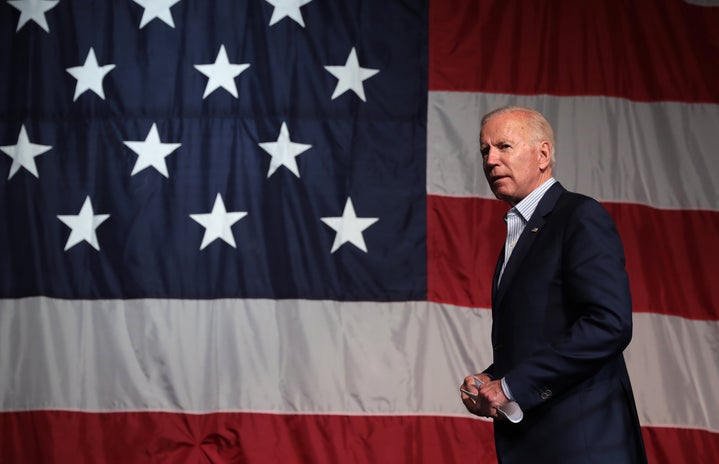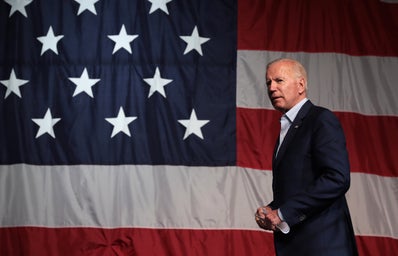Joe Biden is just over a year into the presidency of the United States. He took office in January 2021 and, since then, a series of events have taken place, putting the Democratic government in positions that require difficult decision-making in economics, politics, commerce, health and geopolitics – many of them with major impact, not just for the American people, but for other countries too.
Check out what these major events are and how Biden reacted to these situations. To analyze such actions, Her Campus Cásper Líbero interviewed the International Relations specialist Cassio Tales.
Vaccination
For the first 100 days of his presidential term, Biden promised to distribute 100 million shots of vaccines against COVID-19 to the American population. The president was able to fulfill that goal in just 58 days.
On the other hand, after this initial period of intense vaccination, the rhythm gradually slowed down. Cassio Tales sees this downfall on the immunization rates in the following way: “There’s a matter in the United States that is very emblematic of a very strong anti-vaccine movement, and there is a lot of difficulty to convince those people to get vaccinated. So, despite the first vaccination curve, there was a stabilization.”
On the international aspect, Biden’s posture regarding world immunization has left a lot to be desired. Even though the American president has shown a great deal of concern about the US population, that has not been extended to the rest of the world.
The United States would have the capacity to help the poorer countries to vaccinate their people, be it through buying and donating the shots to these nations or by interfering in accords created by the World Health Organization to favor the access to vaccines.
However, the American government has taken very little action to advance in that direction, and the ones that were taken were very discrete and didn’t make much of an impact. The vaccines that were donated to South American countries, for instance, not only weren’t enough to actually make a difference but were also near their expiration date.
The immigration Crisis
The subject of immigration is one of, if not the most, controversial subject in American politics. And Biden’s stance on it during his campaign was no different: he promised to solve the issue entirely.
The problem with this objective is that it is nearly impossible to achieve it. To Tales, the American government should actively improve on the economic and social indicators of the immigrant’s home countries. This way could really improve this problem. However, nothing has been done in order to put those improvements in course.
The withdrawal of US troops from Afghanistan
Certainly, this was one the most noteworthy events of Biden’s administration so far. In August 2021, the US removed at last their troops from Afghan territory in a disastrous and shameful manner, and many people drew parallels between last year’s withdrawal and the one that took place at the end of the Vietnam War, in 1975.
Cassio Tales believes that this evacuation happened in such a way due to the fact that the American intelligence hoped the Afghan military would be able to maintain a stable country and keep the Taliban from power, both of which haven’t been proven true.
It’s worth noting that the US departure from Afghanistan had been accorded back in 2020, during Donald Trump’s management, and it was scheduled to be over on October 31st, 2021. Until that point, it was slowly progressing.
After that deadline expired, what was left to be done of the evacuation was suddenly done, leaving behind a bankrupt country that was unable to contain the Taliban on its own. The fundamentalist Islamic group that was in power between 1996 to 2001, during this time, the organization was ruled as an authoritarian government, executing members of the opposition, severely punishing the civilians and prohibiting women from frequenting schools and working. Now, the same is happening again.
After the departure of the troops, Biden gave a speech justifying his reasons to leave Afghanistan: “Let me be clear. Leaving on August the 31st is not due to an arbitrary deadline; it was designed to save American lives.” Later on, he added: “I was not going to extend this forever war, and I was not extending a forever exit.” To finish the president said: “I give you my word: With all of my heart, I believe this is the right decision, a wise decision, and the best decision for America.”
Despite that speech, a poll conducted by Reuters in affiliation with Ipsos has shown that the crisis in Afghanistan caused a downfall in Biden’s approval rates, 46% of Americans approved his performance as the president. That was the lowest rate recorded since Biden took office in january 2021.
The AUKUS alliance
This military alliance between Australia, the United States and the United Kingdom was first made public in September of 2021, after it had been secretly elaborated by the three countries. Amongst other things, this agreement foresees the purchase of British nuclear-powered submarines by Australia with American mediation.
Due to the United States’ intervention, France has lost US$65 billion on a submarine sale with Australia that had been negotiated years before the AUKUS was announced, and now will not happen.
Considering the current European scenario, Tales finds it unwise to create friction with France, especially considering the recent departure of Angela Merkel, German chancellor, from power. For 16 years, Merkel played an important part as the mediator of the relationships of the region’s countries. For example, she made the dialogue between nations possible, mainly with Russia.
Currently, it’s French president, Emmanuel Macron, who tries to fulfill this role. And that can be seen in his many attempts to negotiate the peace between Ukraine and Russia.
Consequently, the internationalist affirms that it would be a good strategy to form some sort of alliance with France in the upcoming year, something that the AUKUS accords have made quite difficult to the US. “Soon, there will be the French elections and we should pay lots of attention to see who will be their new leader, who will really step up to power, if Macron will be reelected. Because, if he is reelected, it’s highly likely that he will have the same notoriety in the next 4 years that Angela Merkel had for more that 15 years”, he concludes.
The climate issue
Thirty days after he took office, Biden made sure that the US went back to the Paris Accords after it was removed from it by Donald Trump in 2017.
The American return to the Paris Accords was followed by ambitious promises, such as the decarbonification of the energetic sector by 2035 and the full stopping of greenhouse effect emissions by 2050.
But there is a significant lack of concrete actions to achieve these goals and this became evident in the COP26, the latest Conference of the Parties that was organized.
About which the internationalist comments: “The United States ended up not being the protagonist that was expected in the Conference of the Parties and didn’t get any sort of meaningful accord.”
Surely, this has been a disappointment by the American government, especially considering Biden’s incisive posture regarding the climate crisis during his campaign in 2020.
The Ukraine war
This is one of the most recent events, but is the most relevant of Biden’s term so far. When Russia invaded Ukraine, the question of if the US should or should not interfere directly in the conflict was brought up. After all, the disputes between the White House and the Kremlin aren’t new.
Furthermore, there is a chance that, if Russia succeeds in the war, it will expand its power. Which is less than desirable for the United States.
However, there isn’t any real justification to explain a retaliation by the US: Ukraine isn’t a part of the North Atlantic Treaty Organization (NATO) or even the European Union, despite having rehearsed an approximation of the United States and Western Europe in recent times. On the other hand, a great number of western nations, some of them military and economic powers, have already made clear their discontent with the war in a more proactive way.
About this future American dilemma, the internationalist has presented his point of view: “I believe that Biden will continue to not face the conflict directly. His biggest challenge will be if he should or shouldn’t enter the war”. “I think he won’t do that, precisely due to a popularity issue, due to a Congress issue, due to a safety issue”, adds Tales.
In just the first year of his administration, Biden has faced many challenges, even more than was expected. Some of them he dealt with in a more fortunate way, and some of them not so much. This could be explained by a number of reasons: from the pandemic which he had to face early on, or even the shift in powers across the globe.
“Cautious and conservative in a scenario of extreme changes.” Those characteristics could explain why Biden has had so much difficulty in achieving his goals, according to Cassio Tales. Only time will tell whether or not that is a tendency that will prevail. Biden still has a long way to go as United States president and the next years don’t promise to get easier.
The article above was written by Fernanda Tsukase and edited by Camila Nascimento
Liked this type of content? Check Her Campus Cásper Líbero home page for more!



